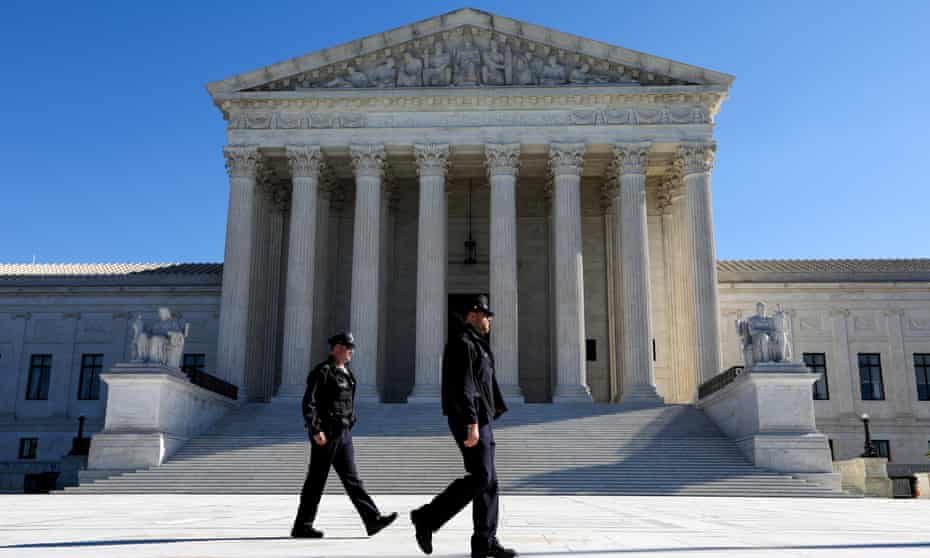How the US supreme court could be a threat to climate action in the US
The US constitutional system could pose a major obstacle to addressing catastrophic threats. A new set of cases shows why

President Joe Biden exhorted other world leaders to treat climate change as an “existential threat to human existence” at the Cop26 global climate summit on Monday. Yet his administration may soon have its hands tied as it seeks to address that threat at home. That’s because just three days earlier, the US supreme court agreed to hear a set of cases challenging the authority of the Environmental Protection Agency (EPA) to impose carbon emissions limits on existing power plants.
Court watchers expect the court’s conservative majority, consistent with a string of rulings in favor of big business and against regulation, to side against the EPA. If so, the decision will highlight how the court could stand in the way of meaningful efforts to address the climate crisis for decades to come. More generally, that outcome would underscore how the supreme court and broader features of the US constitutional system pose a significant obstacle to addressing catastrophic threats.
In simple terms, the related cases all ask whether Congress, in somewhat vague statutory language, authorized the EPA to promulgate rules that would require shifting some electricity generation from high-emissions sources such as coal plants to lower-emitting alternatives. The justices strongly signaled their view that the EPA lacks that authority back in 2016, when they issued a ruling staying the operation of the Obama-era EPA’s Clean Power Plan (CPP) before lower courts had even ruled on challenges. The Trump administration rescinded the CPP, but the US court of appeals for the DC circuit ruled that the rescission was unlawful. The court will now review that decision.
There’s every reason to think the conservative-dominated court will again rule for the challengers. Indeed, the biggest question is not so much how the case will come out, but how boldly the court will rule. Lurking behind the statutory issues in the case is a deeper question: how much rule-making authority does the constitution even permit Congress to delegate to administrative agencies? Implementing a broad “non-delegation doctrine” and thereby dramatically undercutting the regulatory power of administrative agencies like the EPA has been a conservative fantasy for decades.
Whether the court goes big or rules more narrowly, any win for the challengers will underscore how tough it will be for the US to implement significant climate reforms. Although the court in 2007 ruled that the EPA had the authority to regulate greenhouse gases, in the the years since the federal judiciary has become more hostile to regulation and friendlier to business interests. That’s the result of a sustained effort by Republicans and the conservative legal movement to transform the courts that Don McGahn, President Trump’s first White House counsel, is reported to have said was “all about regulatory relief”.
The challengers claim that a ruling against the EPA will merely put the ball back in Congress’s court. But any meaningful climate reforms that managed to make their way through Congress would similarly face their own legal challenges and a hostile judicial audience.
The suspense over the EPA cases may illustrate a stark fact: the American constitutional structure may be ill suited for dealing with catastrophic threats like climate change. The supreme court, with its life-tenured justices second-guessing the work of the political branches, is only one feature of a system that makes bold governmental action difficult.
The American system divides power in numerous ways. Even if both houses of Congress pass legislation, the president can veto it and the courts can find it unconstitutional. Policymaking authority is divided between federal, state and local governments. The electoral college and the rule of equal suffrage for states in the Senate mean that even a strong national majority may not see its preferences enacted into law.
Checks and balances have virtues. The presidential veto, bicameralism and judicial review may promote stability by blocking government from acting rashly. At the same time, some threats require bold and decisive action by government. Our system seems poorly designed for such situations. That has been very much on display recently, as both courts and states have quarreled with the federal government about how to handle the pandemic. Climate change poses an even greater threat than Covid-19, and only bold action will have a hope of addressing it. Whether our system of government will be up to that challenge is far from clear.
Some have argued that addressing the climate crisis may require rethinking society’s basic organizing principles, including capitalism itself. It may also increasingly lead many to question the fundamental tenets of the American constitutional order.
-
Daniel Epps is Treiman professor of law at Washington University in St Louis. He previously served as a law clerk to Justice Anthony Kennedy and co-hosts the supreme court podcast Divided Argument